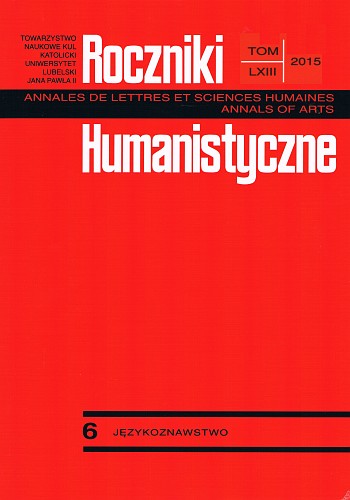Syntactic Patterns of English and Polish Fixed Phrases with Proper Names
Syntactic Patterns of English and Polish Fixed Phrases with Proper Names
Author(s): Anna DąbrowskaSubject(s): Theoretical Linguistics
Published by: Towarzystwo Naukowe KUL & Katolicki Uniwersytet Lubelski Jana Pawła II
Keywords: phraseological fixed phrases;personal names;place names;etymology;syntactic patterns;
Summary/Abstract: This paper focuses on English and Polish fixed phrases involving personal and place names. First, the definition of a name and the distinction between proper and common nouns or proprial lemmas and proper names are provided, following a short overview of theories that constitute the basis for any discussion related to proper names. Next, subcategories and sources of names, together with their linguistic characteristics are presented, followed by the working definition of phraseological fixed units. Afterwards, the study is undertaken of personal and place names in fixed phraseological units, surveying a broad list of English and Polish fixed entities that are classified according to five syntactic patterns: phrases with (1) NPs, (2) VPs, (3) PPs, (4) clauses, and (5) similes. Additionally, the biblical, literary, classical, cultural and historical origins of these expressions are pointed out. Finally, in the light of the examined data, the predominance of personal over place names is noticeable, while the items with NPs constitute the vast majority of the phraseological units. Investigating corpus and dictionary evidence, fixed elements typical either of English or only of Polish, or those common to both English and Polish are listed. The most frequent are the units from biblical and mythological sources, while the least popular are the expressions with historical and literary background, as these aspects are unique for each country. With regard to the meaning of the fixed phrases containing proper personal and place names, the data reveal that the units do convey information, recall connotations that arose some time ago in relation to the biblical, mythological, literary, cultural, and historical background, and are still relevant today.
Journal: Roczniki Humanistyczne
- Issue Year: 63/2015
- Issue No: 06
- Page Range: 53-88
- Page Count: 36
- Language: English

